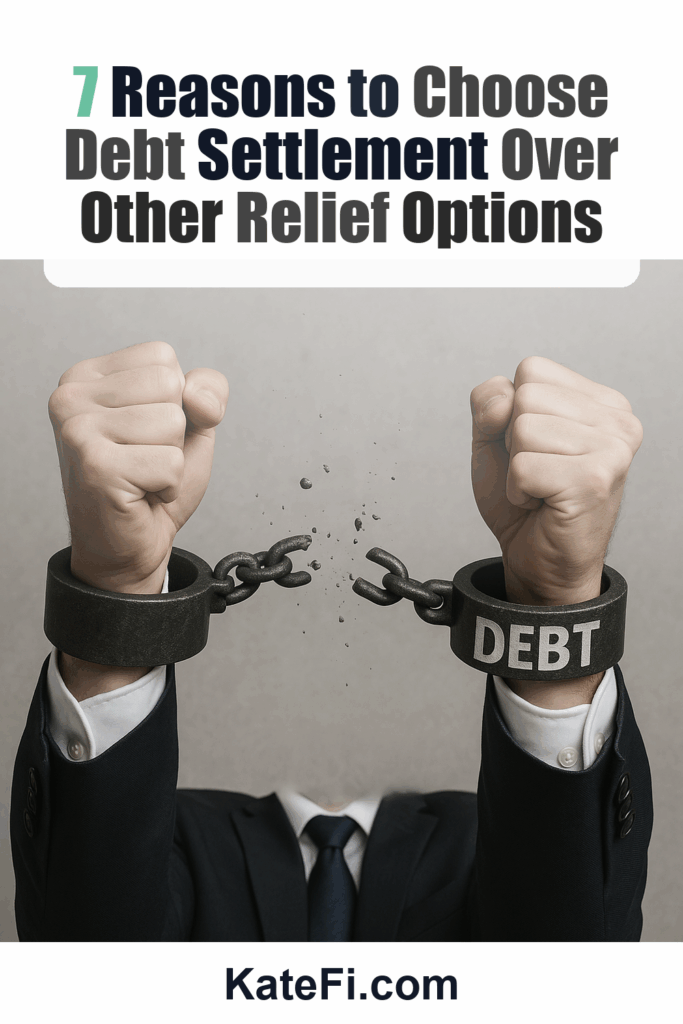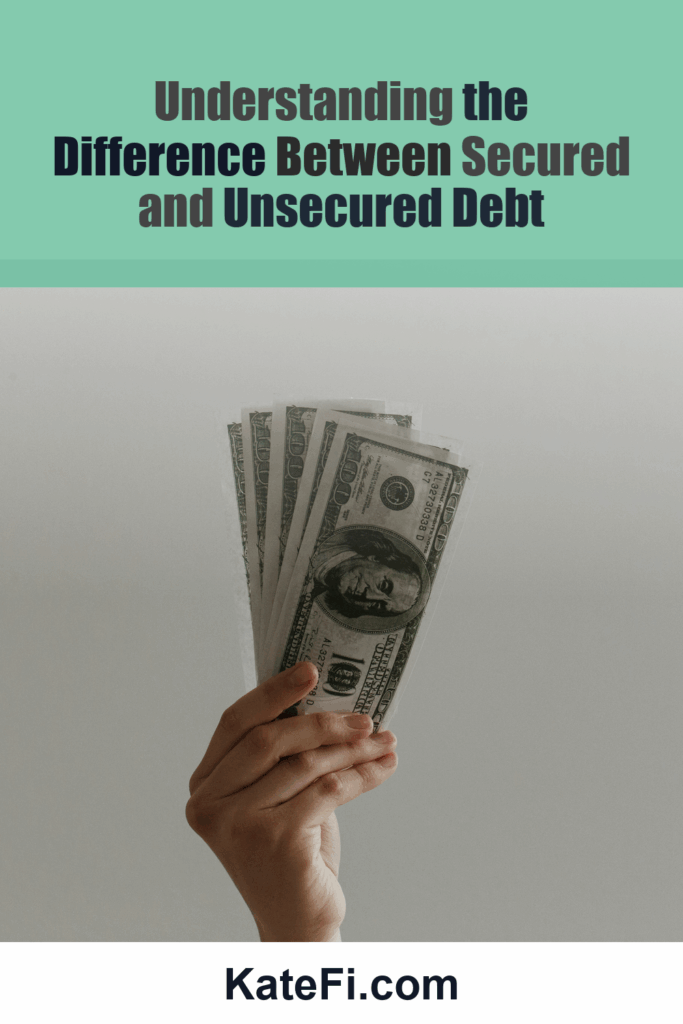Understand pros/cons of settlement vs consolidation vs DMP for your exact mix of debts.
Love our content? Show your support by following us — pretty please!🥺
FOLLOW ON PINTEREST
Hi! I’m Kate, the face behind KateFi.com—a blog all about making life easier and more affordable.
Not available in IL, KS, OR, TN, UT, WV.
Is Debt Settlement Right for You? Pros and Cons You Must Consider
In today’s fast-paced world, debt can easily spiral out of control. If you find yourself grappling with overwhelming credit card balances, personal loans, or medical bills, it’s essential to consider all your options for relief. One such option is debt settlement. But is it right for you? In this blog post, we will walk through a detailed decision-making process to help you understand the pros and cons of debt settlement versus other solutions like Debt Management Plans (DMP) and debt consolidation.
Understanding Debt Settlement
Debt settlement involves negotiating with creditors to pay off a debt for less than what you owe. This usually means making a lump-sum payment, or sometimes multiple smaller payments, that total less than your full debt amount. However, this approach has its own set of implications, especially when it comes to your credit score.
Before we delve into the pros and cons, let’s first clarify when debt settlement might be an appropriate choice for you.
When to Consider Debt Settlement
- Your Debt is Unmanageable: If your monthly payments are a significant strain on your budget and you’re missing payments, it might be time to consider settlement.
- You Can Gather a Lump Sum: Debt settlement often requires you to pay a lump sum that may be less than your original debt. If you have some savings or can borrow from family or friends, this can be a viable option.
- You’re Facing Legal Action: If creditors are threatening lawsuits or have already filed one, debt settlement can be an avenue to avoid further legal repercussions.
Comparing Debt Settlement, DMP, and Consolidation
To make an informed choice, it’s important to understand how debt settlement stacks up against other common debt relief methods. Here’s a quick comparison table to highlight key differences:
| Method | Credit Score Impact | Payment Structure | Pros | Cons |
|---|---|---|---|---|
| Debt Settlement | Short-term hit | Lump-sum payments | Potentially reduced debt amount | Significant credit score impact |
| Debt Management Plan | Gradual improvement | Monthly payments | Structured repayment, credit counseling | No reduction in principal amount |
| Debt Consolidation | Short-term impact | Single monthly payment | Simplifies payments, potential lower interest rates | May not address underlying spending habits |
✅ See If You Qualify for Debt Relief
Pros of Debt Settlement
- Reduced Total Debt: One of the most significant advantages of debt settlement is that you may be able to pay off your debt for less than what you owe.
- Quicker Resolution: Debt settlement can lead to a quicker path out of debt compared to other options. Many people complete their settlement in a matter of months or a couple of years.
- Avoid Bankruptcy: If you’re considering bankruptcy, debt settlement can be a less severe alternative, allowing you to avoid long-term credit score damage.
Cons of Debt Settlement
- Credit Score Impact: One of the biggest downsides is the effect on your credit score. Your score may drop significantly when creditors realize you are not paying the full amount. While it may improve over time, the short-term consequences can be substantial.
- Potential Tax Implications: If a creditor forgives a debt of $600 or more, you may receive a Form 1099-C and owe taxes on the forgiven amount.
- Creditor Resistance: Not all creditors are willing to negotiate. Some may reject your settlement offer or continue collection efforts, complicating your situation.
- Fees: Many companies that offer debt settlement services charge fees, which can add to your financial burden.
Making the Decision: A Step-by-Step Roadmap
To help guide your decision, follow these steps:
- Evaluate Your Debt Situation:
- Gather documentation of all your debts, including balances, interest rates, and payment histories.
- Assess Your Budget:
- Create a detailed budget to understand how much you can realistically afford to pay monthly or as a lump sum.
- Check Your Credit Report:
- Obtain a copy of your credit report and identify how debt settlement might affect your score in the short and long term.
- Explore Alternatives:
- Look into Debt Management Plans (DMP) and debt consolidation options. For example, if you qualify for a DMP, you can work with a credit counseling agency to set up a structured repayment plan that might have a lesser impact on your credit.
- Consult with a Professional:
- Before making a final decision, consider getting a free consultation to review all your options.
Preparing for Consultation
To facilitate a thorough review during your consultation, gather the following documents:
- Recent credit reports
- Monthly statements from all creditors
- Proof of income (pay stubs, bank statements)
- Detailed list of monthly expenses
Credit Impact: Short-Term vs. Long-Term Trade-offs
Debt settlement can create a short-term hit to your credit score, especially if you’re settling debts that are already in collections or if you’ve been late on payments. However, if successful, your overall debt burden may decrease, potentially improving your credit score over time.
In contrast, alternatives like DMP and debt consolidation might initially lead to a smaller impact on your score, but they usually don’t offer the same debt reduction benefits.
Conclusion
Deciding whether debt settlement is the right path for you requires a thorough understanding of your financial situation, an evaluation of the pros and cons, and exploring all available options. While the lure of reducing your overall debt may be appealing, the implications on your credit score and potential fees must be weighed carefully.
To ensure that you make the best choice for your financial future, we strongly recommend getting a free consultation with a debt relief expert. They can help you navigate this critical decision, explain your options, and provide a personalized roadmap to get back on track.
✅ See If You Qualify for Debt Relief
Important: This content is for education only—not legal, tax, or financial advice. Results and eligible programs vary by situation and state. Fees apply if you enroll and complete a program. Debt relief can affect credit; missed payments may lead to collections/lawsuits. Not available in IL, KS, OR, TN, UT, WV.
In making your decision about debt relief, knowledge is power. Take the time to explore your options and make an informed choice to regain your financial freedom.
What You’ll Learn on the Call
- Estimated timeline and monthly payment range
- How credit may be affected in the short term
- What documents to gather to move faster
Not available in IL, KS, OR, TN, UT, WV.






















